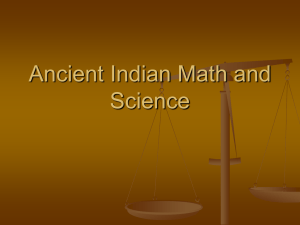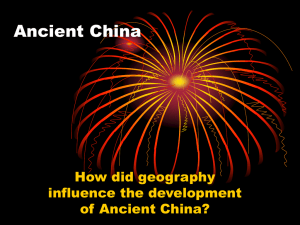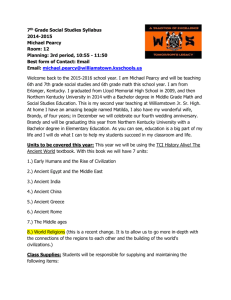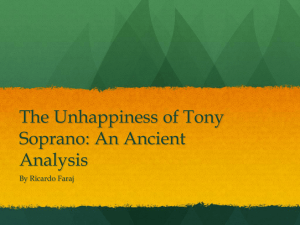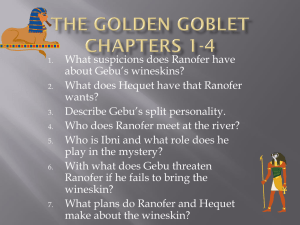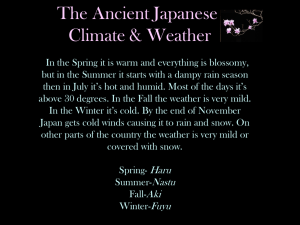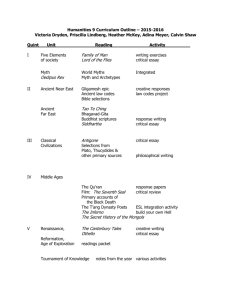Ancients vs. Moderns
advertisement
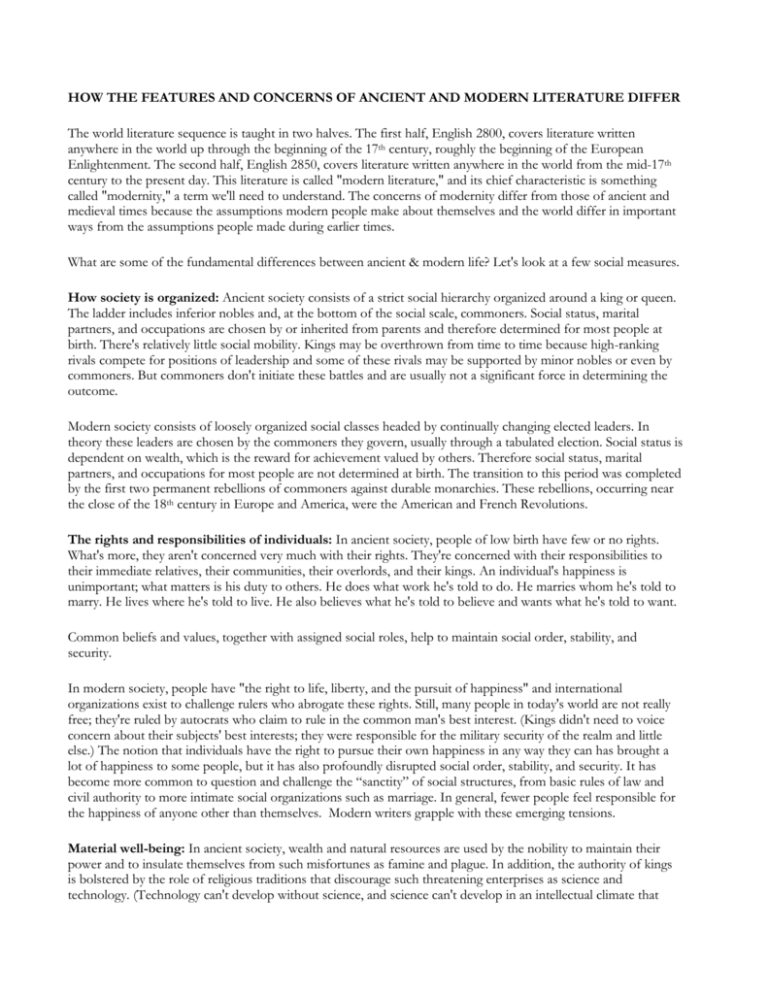
HOW THE FEATURES AND CONCERNS OF ANCIENT AND MODERN LITERATURE DIFFER The world literature sequence is taught in two halves. The first half, English 2800, covers literature written anywhere in the world up through the beginning of the 17th century, roughly the beginning of the European Enlightenment. The second half, English 2850, covers literature written anywhere in the world from the mid-17th century to the present day. This literature is called "modern literature," and its chief characteristic is something called "modernity," a term we'll need to understand. The concerns of modernity differ from those of ancient and medieval times because the assumptions modern people make about themselves and the world differ in important ways from the assumptions people made during earlier times. What are some of the fundamental differences between ancient & modern life? Let's look at a few social measures. How society is organized: Ancient society consists of a strict social hierarchy organized around a king or queen. The ladder includes inferior nobles and, at the bottom of the social scale, commoners. Social status, marital partners, and occupations are chosen by or inherited from parents and therefore determined for most people at birth. There's relatively little social mobility. Kings may be overthrown from time to time because high-ranking rivals compete for positions of leadership and some of these rivals may be supported by minor nobles or even by commoners. But commoners don't initiate these battles and are usually not a significant force in determining the outcome. Modern society consists of loosely organized social classes headed by continually changing elected leaders. In theory these leaders are chosen by the commoners they govern, usually through a tabulated election. Social status is dependent on wealth, which is the reward for achievement valued by others. Therefore social status, marital partners, and occupations for most people are not determined at birth. The transition to this period was completed by the first two permanent rebellions of commoners against durable monarchies. These rebellions, occurring near the close of the 18th century in Europe and America, were the American and French Revolutions. The rights and responsibilities of individuals: In ancient society, people of low birth have few or no rights. What's more, they aren't concerned very much with their rights. They're concerned with their responsibilities to their immediate relatives, their communities, their overlords, and their kings. An individual's happiness is unimportant; what matters is his duty to others. He does what work he's told to do. He marries whom he's told to marry. He lives where he's told to live. He also believes what he's told to believe and wants what he's told to want. Common beliefs and values, together with assigned social roles, help to maintain social order, stability, and security. In modern society, people have "the right to life, liberty, and the pursuit of happiness" and international organizations exist to challenge rulers who abrogate these rights. Still, many people in today's world are not really free; they're ruled by autocrats who claim to rule in the common man's best interest. (Kings didn't need to voice concern about their subjects' best interests; they were responsible for the military security of the realm and little else.) The notion that individuals have the right to pursue their own happiness in any way they can has brought a lot of happiness to some people, but it has also profoundly disrupted social order, stability, and security. It has become more common to question and challenge the “sanctity” of social structures, from basic rules of law and civil authority to more intimate social organizations such as marriage. In general, fewer people feel responsible for the happiness of anyone other than themselves. Modern writers grapple with these emerging tensions. Material well-being: In ancient society, wealth and natural resources are used by the nobility to maintain their power and to insulate themselves from such misfortunes as famine and plague. In addition, the authority of kings is bolstered by the role of religious traditions that discourage such threatening enterprises as science and technology. (Technology can't develop without science, and science can't develop in an intellectual climate that discourages or even forbids questioning the description of the world in, say, an ancient religious text.) Also, it's not in the best interest of kings or ancient churches to encourage trade (free or otherwise) or to encourage acceptance of cultural diversity. Trade is threatening for more than one reason. Not only does it introduce new ideas and new wants, but it also creates a new social class, the merchant class, which begins to accrue a lot of wealth and power. Modern society is a world of merchants, bankers, lawyers, doctors, scientists, and technicians. All of these new occupations have arisen in a different kind of society that requires them to meet the needs and wants of individuals pursuing their own rights and happiness. Each one of these occupations tells us a lot about the wellbeing of the modern citizen of an industrial society. We need merchants because lots of people have a fair amount of money to spend in pursuit of novelty, entertainment, and self-improvement. We need bankers to keep track of this money and organize it so that money itself can make more money (something that only happens in the modern world). We need lawyers because a whole society of individuals aggressively pursuing their own happiness is bound to come in conflict with one another. Increasingly complicated laws are necessary to control this conflict. The laws have grown so complex that only those who study them as a life's work understand them. We need doctors because medical care is no longer a need to be pursued only when absolutely necessary. Rather, it's a service that can be pursued and even purchased at will whenever it might improve the quality of someone's life. We need scientists to continually discover new ways to eliminate discomfort and unhappiness. And we need technicians to increase the ease and convenience of every aspect of our individual lives. Spiritual and psychological wellbeing: Ancient society is a highly ordered world. While it affords little freedom, it does afford certain psychological comforts. Just as ancient man doesn't question the authority of his king, he also doesn't question the authority of his God or gods. He doesn't question the prevailing wisdom about the purpose of a human life, or man's place in nature. He has fixed codes by which he can measure his worth as a man. He knows whether he's highly regarded or not, and he knows why. His life may be harder and shorter than modern man's, but if he endures these hardships without complaint, he may earn for himself a deep sense of satisfaction. He has the secure knowledge that he lived his life as his God, his friends, his king, and his loved ones require. No one will question the worth of his life, precisely because he devoted it to the fulfillment of duty rather than to the pursuit of his own happiness. Modern man pursues his own material happiness and physical wellbeing with much greater determination and success than his ancestors did. But this may happen at the expense of his psychological and spiritual wellbeing. Modern people often live in isolation from and competition with others and have fewer strong community ties, which were the basis of survival in the ancient world. It isn't surprising to discover that changed lives have produced changed assumptions and beliefs about what life should be. The writers of modern texts often question these social changes. Have such changes done more harm than good? Ancient World Hero is a model of the ideal human type. Must be noble. 18th/19th Century Hero is a common man. 20th/21st Century Hero is often a pitiful victim or a mental patient. Hero is tragic. His downfall is due to his own internal character flaws. He arouses terror and pity because such a great man has such a big fall. Hero is partly tragic and partly pathetic. Like Ivan Ilyich, he is partly responsible for what happens to him, but the deck is also stacked against him by his society. Hero is clearly pathetic. He's a victim of circumstances completely beyond his control. Often he's particularly pitiful, like Gregor Samsa in Kafka's "Metamorphosis." Society is never criticized. For example, warfare is a source of great tragedy in the ILIAD, but it wouldn't occur to Homer that a world without war could exist. Society's flaws are no longer taken for granted. Writers point out what's wrong with society and think man should try to improve society. Society is insane, absurd, and pointless, as in all the stories of Kafka. Life basically makes sense. You make mistakes, but can learn from these mistakes, or your tragedy is a lesson for others. Works of literature begin to question whether or not life makes sense. Does Orgon’s attitude toward Tartuffe make sense? Does Ivan Ilyich's career make sense? How can we understand it? Society clearly makes no sense. Again, see Gregor.
